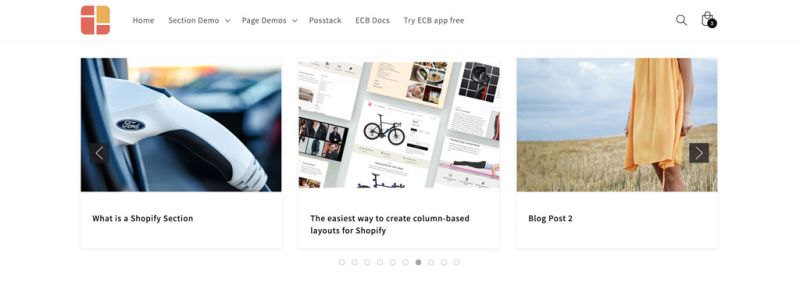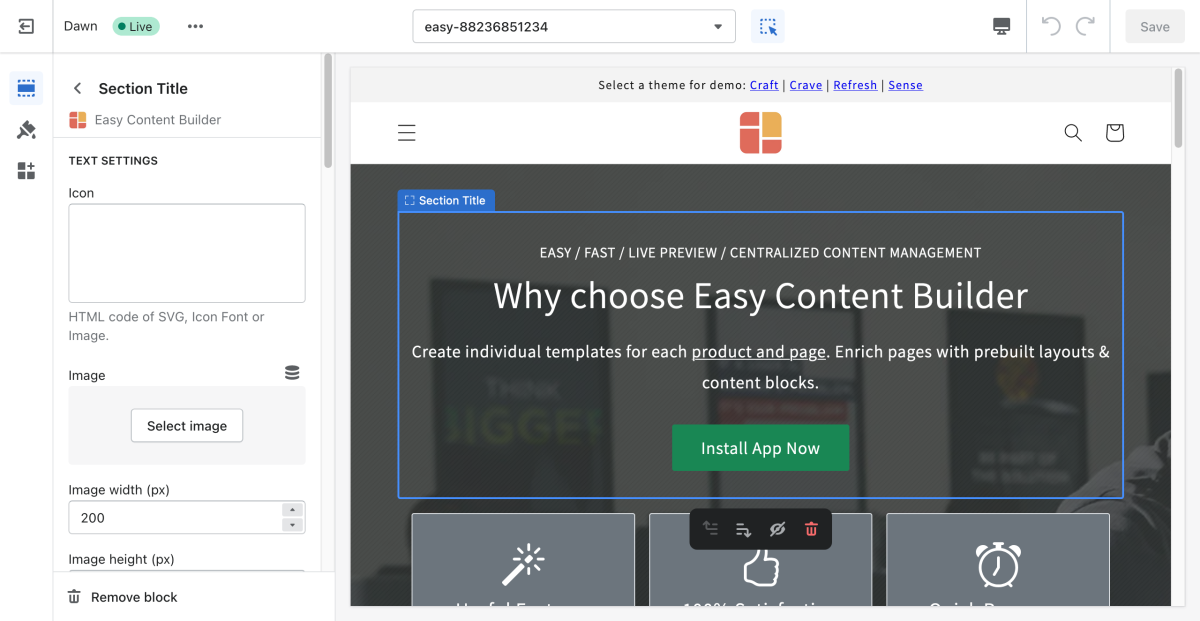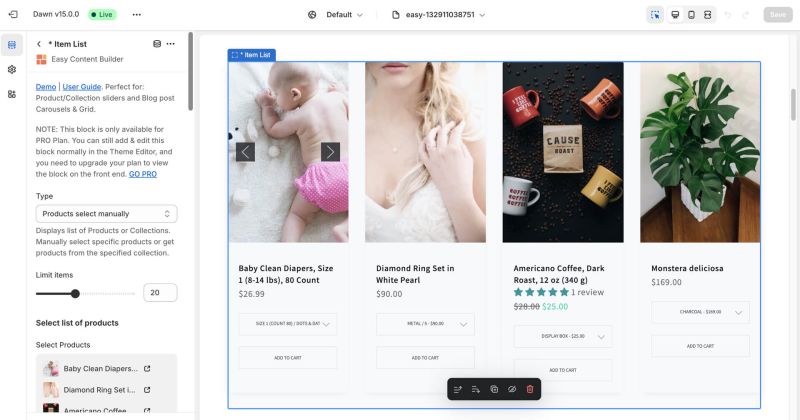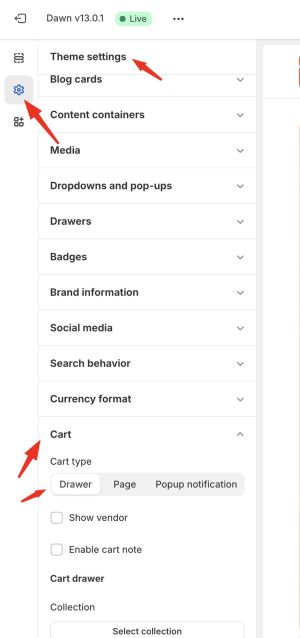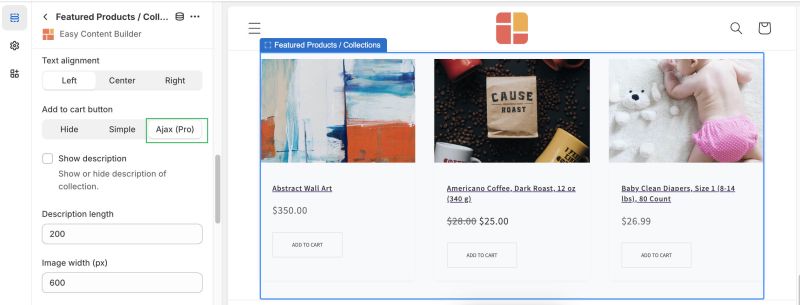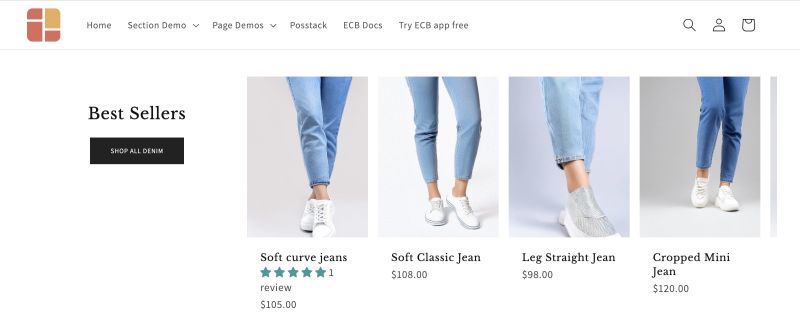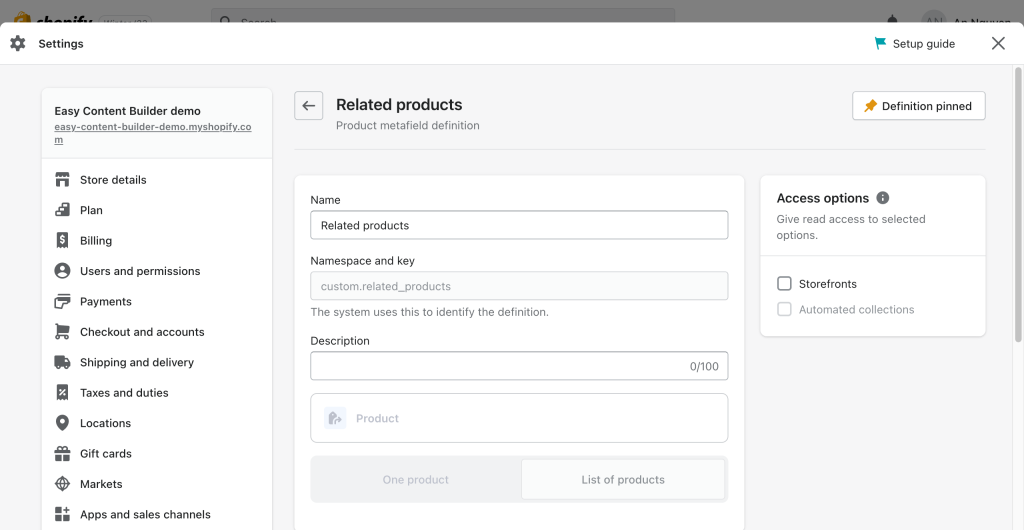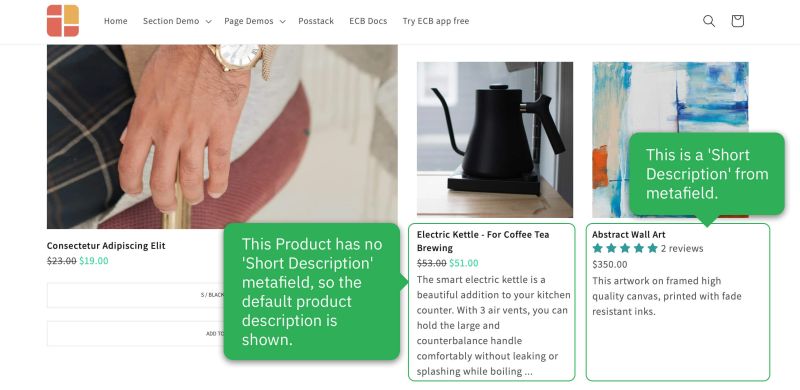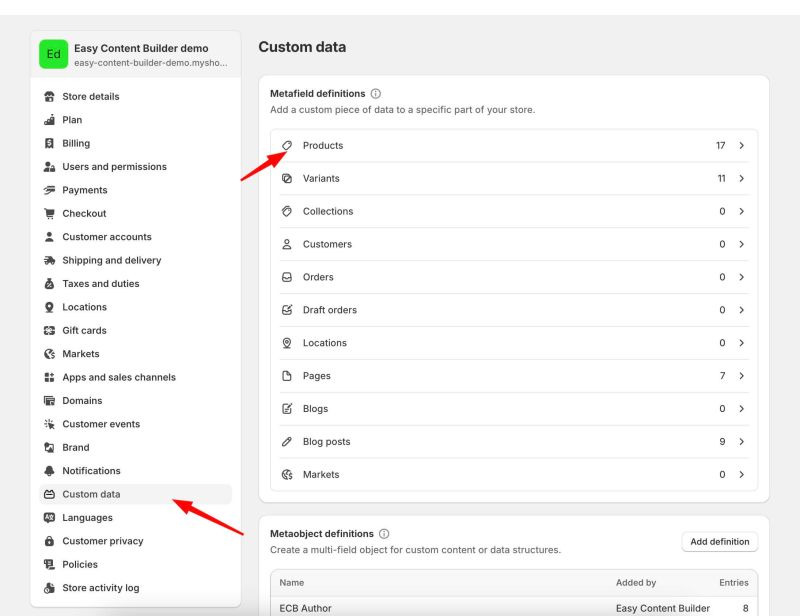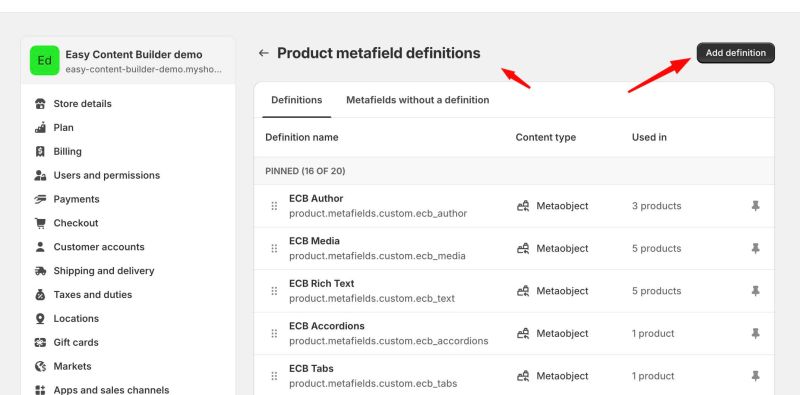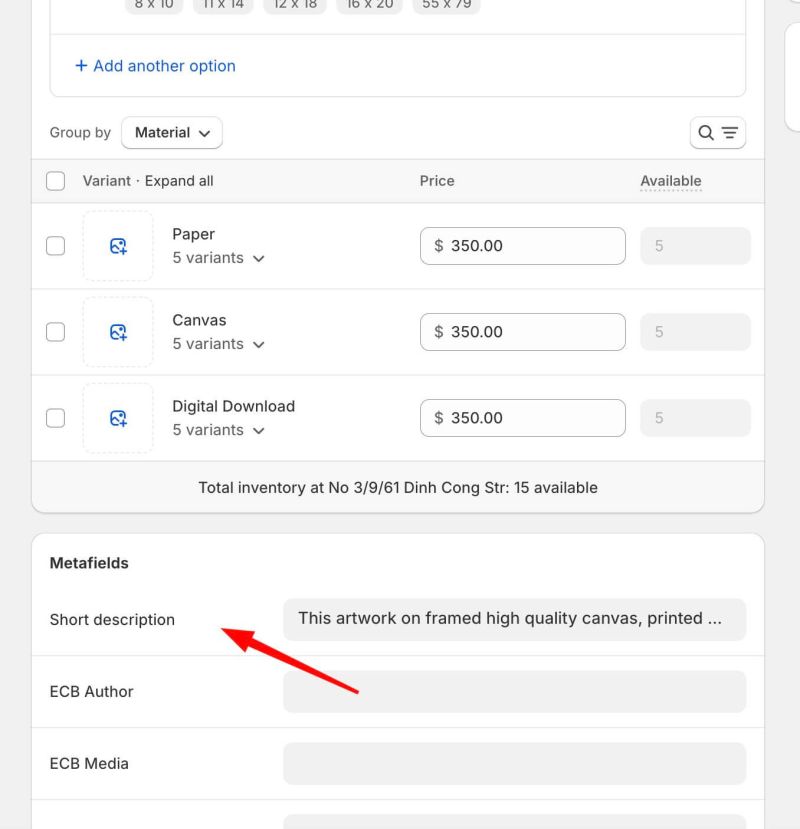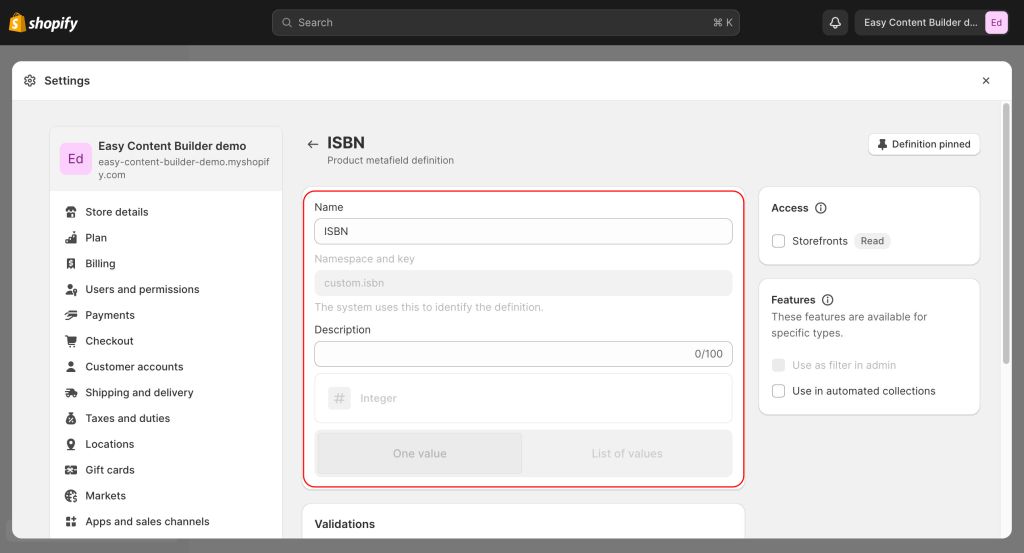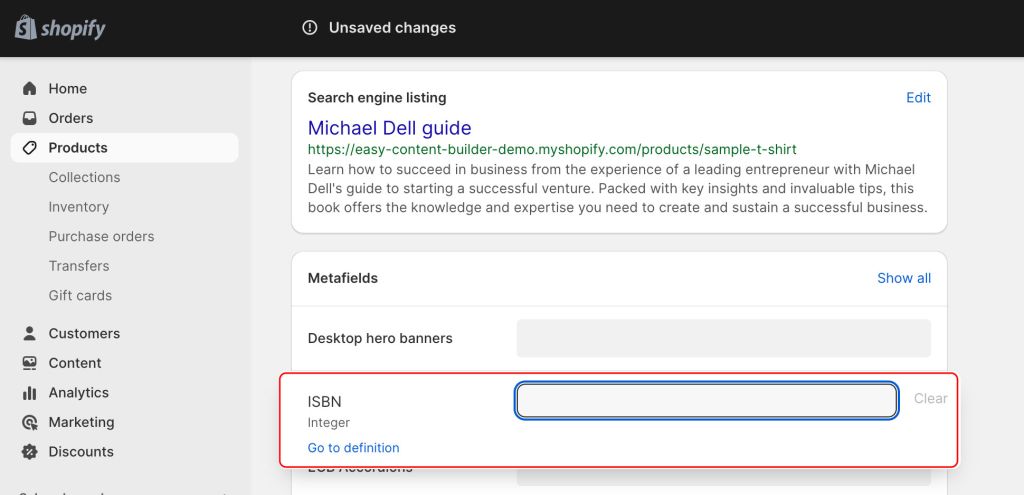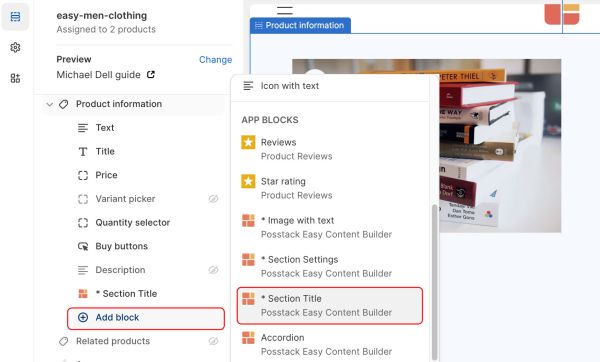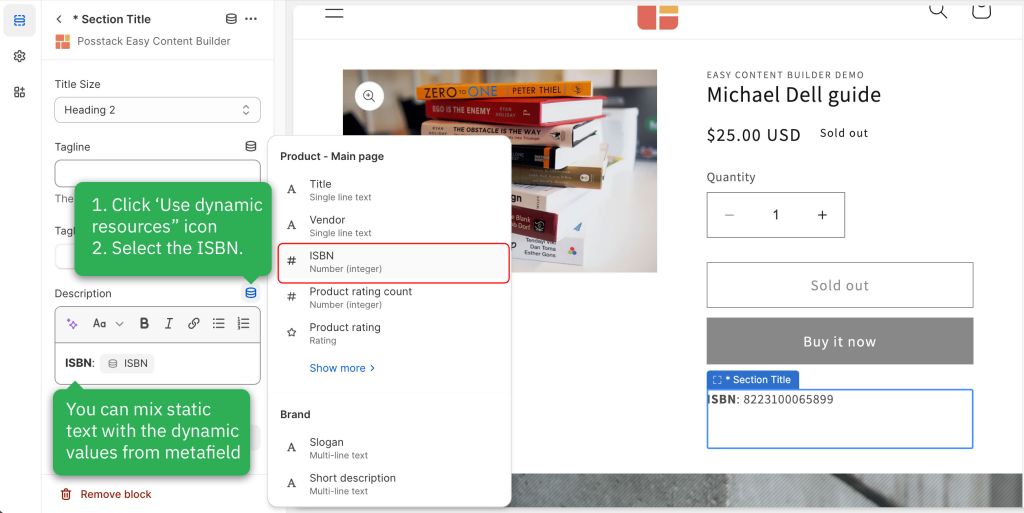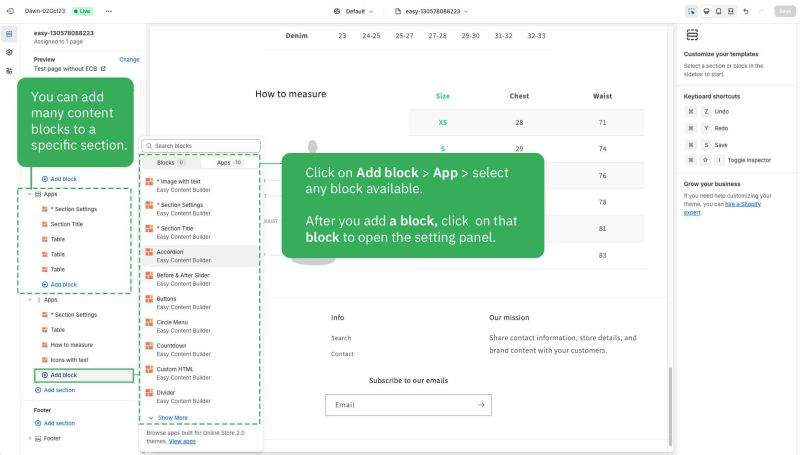Block Featured Products: Difference between revisions
No edit summary |
mNo edit summary |
||
| (76 intermediate revisions by 2 users not shown) | |||
| Line 1: | Line 1: | ||
{{DISPLAYTITLE:Block: Item List}} | |||
==Overview== | |||
The '''Item List''' section, formerly known as the '''Featured Products/Collections''' section, allows you to include: | |||
From the Shopify theme editor, click on ''' | 1. A slider or grid of featured products (with ''Ajax Add to Cart'') showcasing specific products or an entire collection on any Shopify page. | ||
2. A carousel or grid of blog posts. | |||
===Item List examples=== | |||
====Featured Products/Collections Slider and Grid==== | |||
{{Note|See Featured Products examples [https://easy-content-builder-demo.myshopify.com/products/beauty here], [https://easy-content-builder-demo.myshopify.com/products/sofa here], and [https://easy-content-builder-demo.myshopify.com/products/diamond-ring-set-in-white-pearl here].|inline}} | |||
[[File:Ecb-featured-products.png|border|frameless|800x800px]] | |||
====Article Carousel and Grid==== | |||
{{Note|See an article carousel example [https://easy-content-builder-demo.myshopify.com/pages/section-article-carousel here].|inline}} | |||
[[File:Ecb-article-slider.jpg|frameless|800x800px]] | |||
== How to add Item List section == | |||
=== Add Item List section=== | |||
*'''Step 1''': Add a '''Section Settings''' section that allows you to control the global settings of the Item List section. | |||
:In this special section, you can specify multi-column layouts, activate full width, determine the section's maximum width, choose a background color, and set global margins and padding, among other options. | |||
:{{Note|Note: If you include the '''Item List''' in the core product information, skip the step for adding '''Section Settings'''. Just add the Item List. [[File:Ecb add section core product info.jpg|800px|frameless]]|reminder}} | |||
*'''Step 2''': Add an '''Item List''' section and customize the settings according to your preferences. | |||
:[[File:Block section title.png|1200x1200px]] | |||
{{Note|''If you are new to our Easy Content Builder, please take a look at the [[Add_section_settings|Add Sections]] section for detailed instructions on how to add a section to your theme.|inline}} | |||
==Customize Item List== | |||
=== Item List global settings === | |||
From the Shopify theme editor, click on '''Item List''' on the sidebar to view the details of settings. | |||
[[File:Ecb-item-list-section.jpg|frameless|800x800px]] | |||
{| class="wikitable" | {| class="wikitable" | ||
!Section settings | !Section settings | ||
!Description | !Description | ||
|- | |- | ||
| | |Type | ||
|Select the source of products that you want to feature: | |Select the source of products that you want to feature: | ||
* Select products manually: show only products that you | * '''Select products manually''': show only specific products that you manually select. | ||
* Products in collection: show all products that | * '''Products in collection''': show products (new products appearing first) from a particular collection. | ||
* '''Random products in Collection''': show a group of products chosen from a random location within the collection. | |||
* '''Collections''': show either a single or all product collections. | |||
* '''Articles''': show a list of articles from the blog of the currently viewed article or from the default Shopify blog 'News' (See the '''NOTE #2''' below for further info). | |||
* '''Random Articles''': show a group of articles chosen from a random position within the blog. | |||
'''NOTE #1''': If the "''Products in Collection''" or "''Random Products in Collection''" types are selected: | |||
* When the block is assigned to the Product page and the Collection setting is not selected, it will show a list of products from the collection of the current product being viewed. | |||
* When the block assigned to the Collection page and the Collection setting is not selected, it will display a list of products from the current collection being viewed. | |||
'''NOTE #2''': For 'Articles' and 'Random Articles' types: | |||
* If you add an '''Item List''' section to ''Article'' pages, it will show a list of articles from the blog of the currently viewed article. | |||
* When you add an '''Item List <nowiki/>'''section to other pages (homepage, product, or store page), it will display a list of articles from the default Shopify blog '<nowiki/>N<nowiki/>ews'. | |||
|- | |||
|Item Limit | |||
|The maximum number of products or articles that you can feature in the Item List section. | |||
|- | |- | ||
|Select Products | |Select Products | ||
| | |Us<nowiki/>e this setting when you set '''Type''' to ''Select products manually''. Use the '''Search''' bar to search for a specific product term or select the products available in the list. | ||
|- | |- | ||
|Select Collection | |Select Collection | ||
|Use this setting when you set ''' | |Use this setting when you set '''Type''' to ''Products in collection''. Use the '''Search''' bar to search for a specific collection term or select the product collection available in the list. | ||
'''NOTE''': If you select "''Random products in Collection''" as the '''type''', make sure to familiarize yourself with how this feature functions. | |||
1. By default, the order of products inside a collection is fixed, for example collection A has 50 products, all products order will be from 1, 2, ..., 49, 50. | |||
With the default Featured Products/Collections section, when you select to show 5 or 10 products from this collection A, the group of products will always start from 1, 2,...5 or 1,2,... 10. | |||
With ''<nowiki/>'Random products in Collections''<nowiki/>' enabled, Featured Products/Collections will show that group of 5 or 10 products starting from a random position. For example, 4, 5, 6, 7, 8 or 10, 11, ...14. | |||
2. The product list may not always update immediately when refreshing a page due to caching by Shopify. Therefore, any changes to the product list on the page will be reflected after a few hours. | |||
|- | |||
|Select list of collections | |||
|Use this setting when you set '''Type''' to ''Collections''. Use the '''Search''' bar to search for a specific collection term or select the collections available in the list. | |||
|- | |||
|Style | |||
|Select Slider or Grid to create a slider of products or a product grid with up to 5 products per row. | |||
|- | |- | ||
| | |Card Style | ||
| | |Create layout boxes for each product item. Emphasize an item with a primary card style. | ||
|- | |- | ||
| | |Card Size | ||
| | |Decrease or increase the padding of the card body. | ||
|- | |||
|Box Shadow | |||
|Decrease or increase the box shadows of the card. | |||
|- | |- | ||
|Text Alignment | |Text Alignment | ||
|Align the Products’ title and price to the left, right, or center. | |Align the Products’ title and price to the left, right, or center. | ||
|- | |||
|Rounded Border | |||
|Enable this setting to apply rounded corners. | |||
|- | |||
|Show multiple images | |||
|If enabled, users can click Prev/Next arrows within the product cards to scroll through multiple product images. This feature is only available for the Grid layout. | |||
|- | |||
|Add to Cart button | |||
| | |||
* Hide: hide the Add to Cart button. | |||
* Simple: show the standard Add to Cart button | |||
* Ajax: This feature is available for the '''Pro''' plan only. If enabled, it allows customers to add products to their cart without leaving the current page. '''Add to cart''' button is always visible. | |||
* Ajax-hover: The '''Add to Cart''' button appears only on hover. | |||
'''Note''': To use the Ajax Add to Cart feature, you must enable the Cart type 'Drawer' under your theme. Learn how to enable the Drawer type here. | |||
|- | |||
|Show Description | |||
|Show or hide descriptions of products/collections. | |||
|- | |||
|Description Length | |||
|Keep your descriptions long enough that they're sufficiently descriptive. The "optimal" length will vary depending on your specific situation. | |||
|- | |- | ||
|Image Width | |Image Width | ||
| Line 37: | Line 127: | ||
|Set the width (in pixel) of the collection’s featured image. | |Set the width (in pixel) of the collection’s featured image. | ||
|- | |- | ||
| | |(Items per row) Item Width on Mobile | ||
| | |Define the width of the product card. | ||
* 1/2: The item takes up halves of its parent container. | |||
* 2/3: The item takes up two-thirds of its parent container. | |||
* 3/4: The item takes up three-fourths of its parent container. | |||
|- | |- | ||
| | |(Items per row) Item Width on Desktop | ||
| | |Item width on desktop: | ||
* 1/1: Fills 100% of the available width | |||
* 1/2: The item takes up halves of its parent container. | |||
* 1/3: The item takes up a third of its parent container. | |||
* 1/4: The item takes up a fourth of its parent container. | |||
* 1/5: The item takes up a fifth of its parent container. | |||
* 2/3: The item takes up two-thirds of its parent container. | |||
* 3/4: The item takes up three-fourths of its parent container. | |||
* 4/5: The item takes up a fourth-fifths of its parent container. | |||
|- | |- | ||
| | |Gap | ||
|Set the | |Set the gap between items. | ||
|- | |- | ||
| | |Auto Play | ||
|Change slides of products after a specified interval (in milliseconds). Enter 0 to disable. | |Change slides of products after a specified interval (in milliseconds). Enter 0 to disable. | ||
|- | |- | ||
|Slider | |Show Slider Arrows | ||
| | |Show or hide the slider arrows on the Desktop. Place arrows inside or outside. | ||
|- | |- | ||
| | |Show Navigation | ||
| | |Show or hide the dot navigation. | ||
|- | |- | ||
| | |Slider Set | ||
| | |To loop through a set of slides instead of single items. | ||
|- | |- | ||
| | |Animate On Scroll | ||
| | |It lets you apply different types of animation to elements within each section as you scroll down the page. Learn more about scrolling animations [https://posstack.com/blog/easy-content-builder-new-updates-mar-2023 here]. | ||
|- | |- | ||
|Margin | |Margin | ||
|Set the | |Set the vertical spacing between elements. | ||
|} | |} | ||
=== Enable Ajax Add to Cart === | |||
{{Note|Note: Ajax Add to Cart is only available for the Pro plan.|inline}} | |||
'''Step 1: Enable the Drawer cart type''' | |||
* From your Shopify admin, click Online Store > '''Themes'''. | |||
* Find your current theme, and then click '''Customize'''. | |||
* Click '''Theme settings''' (the Gear icon) | |||
* Navigate to the '''Carts''' and set the '''Cart Type''' to '''Drawer'''. | |||
:[[File:Dawn theme cart type.jpg|frameless|638x638px]] | |||
'''Step 2''': Navigate to the '''Featured Products/Collections''' configuration under Easy Content Builder and set the '''Add To Cart''' button to '''Ajax (Pro)''': | |||
:[[File:Ecb-ajax-atc-config2.jpg|frameless|800x800px]] | |||
== Use Cases == | |||
===Display the Judge.me reviews === | |||
Integrating Judge.me with Easy Content Builder is simple. The integration is included by default, so just use the Shopify theme editor to show or hide Judge.me reviews. | |||
{{Note|Note that this feature is only available on Easy Content Builder's Pro plan.|inline}} | |||
{{Note|Check out these examples of Judge.me and Easy Content Builder: [https://easy-content-builder-demo.myshopify.com/pages/homepage-denim demo 1], [https://easy-content-builder-demo.myshopify.com/pages/homepage-t-shirts demo 2], [https://easy-content-builder-demo.myshopify.com/pages/homepage-gym-clothes demo 3].|reminder}} | |||
[[File:Judgeme.jpg|frameless|800x800px]] | |||
If you're new to Easy Content Builder and want to add a Featured Products/Collections section with Judge.me reviews, here are [https://posstack.com/blog/judge-me-easy-content-builder-integration the steps to follow]. | |||
=== Add Related Product section using Dynamic sources === | |||
Besides the default option - '''Select products manually''' mentioned in Part 1 above, you can also display the Related Products using '''Dynamic sources'''. | |||
{{Note|'''<u>NOTE</u>''': Adding Related Products using the Dynamic sources best fits when you want to apply the same template to many products, and each product comes with its specific (dynamic) list of Related Products.|info}} | |||
{{Note|'''<u>Info</u>''': Dynamic sources link the product data as a metafield to section input settings, which lets you add metafields to pages right from the theme editor. Shopify offers different types of metafields to add custom data to a specific part of your Shopify store. Learn more [https://help.shopify.com/en/manual/custom-data/metafields here].|reminder}} | |||
===== Step 1: Create a metafield definition for the Related Products ===== | |||
* From your Shopify admin, click '''Settings''' > '''Custom Data''' | |||
* Click '''Products''' > click '''Add definition''' | |||
* In the Product Metafield definition form, assign a namespace (the group that your metafield will belong to) and a key (the specific metafield name) as follows: | |||
<blockquote> | |||
* '''Name''': Related products | |||
* '''Namespace and key''': '''''custom.related_products''''' | |||
* '''Description''': (optional) | |||
* '''Select type''' > Product, make sure you enable '''List of Product'''. | |||
[[File:Metafield definition.png|alt=Shopify Metafield definition|1024x1024px]] | |||
</blockquote> | |||
===== Step 2: Add value to the metafield ===== | |||
* From your Shopify admin > click '''Products''' > click the Product you want to add Related Product section. | |||
* Scroll down to the '''Metafield''' section > click '''Related Products''' field to select the products you want to display as Related Product: [[File:Metafield values.png|1024x1024px]] | |||
===== Step 3: Link the product metafields to your template ===== | |||
* From your Shopify admin, click '''Apps''' > '''Easy Content Builder''' | |||
* Click '''Manage Templates''' > find the template of the product you want to edit, then click '''Customize''' | |||
* Navigate to the section you want to add the Related Products. | |||
** For example: you add Related Products to the core Product section, simply click '''Add block''' > click '''Featured Products''': [[File:Featured block.png|1024x1024px]] | |||
** Open the '''Featured Products''' section you’ve just created > click the '''''connect dynamic source''''' icon next to the '''Select Products''' field > click '''Related Products''' > then click '''Save''' to apply the changes to the storefront. [[File:Link metafield to template.png|1024x1024px]] | |||
** Once you assign the related products using dynamic sources, you can edit and change the products your way through the Theme Editor. [[File:Configure related products.png|1024x1024px]] | |||
===Display a custom Product description=== | |||
[[File:Ecb-metafield-custom-desc.jpg|border|frameless|800x800px]] | |||
You can choose to display or conceal the product description in a product carousel using the Featured Products section. If you want to use a distinct product description instead of the default product description snippet on the product page, follow these guidelines: | |||
=====Step 1: Create a new metafield definition for the custom product description===== | |||
*From your Shopify admin, click '''Settings''' > '''Custom Data''' | |||
:[[File:Ecb metafield def 1 cust desc.jpg|border|frameless|800x800px]] | |||
*Click '''Products''' > click '''Add definition''' | |||
:[[File:Ecb metafield def 2 cust desc.jpg|border|frameless|800x800px]] | |||
*In the Product Metafield definition form, assign a namespace (the group that your metafield will belong to) and a key (the specific metafield name) as follows: | |||
:*Name: ''Short description'' | |||
:*Namespace and key: ''custom.short_description'' | |||
:*Description: (optional) | |||
:*Select type > Product, and make sure you enable ''Multi-line text''. | |||
:[[File:Ecb metafield def 3 cust desc.jpg|frameless|800x800px]] | |||
=====Step 2: Add value to the metafield===== | |||
*From your Shopify admin > click '''Products''' > click the '''Product''' you want to add custom short description. | |||
*Scroll down to the '''Metafields''' section > click the '''Short description''' field to enter the short description you want to display in the Featured Products/Collections carousel. | |||
:[[File:Ecb metafield 4 cust desc.jpg|frameless|829x829px]] | |||
=====Step 3: Enable the "Show Description" setting===== | |||
*From your Shopify admin, click '''Apps''' > '''Easy Content Builder''' | |||
*Click '''Manage Templates''' > find the template you want to edit, then click '''Customize.''' | |||
*From the Theme Editor, open the Featured Products/Collections section you wish to edit. | |||
*Enable the ''Show Description'' setting. | |||
The Featured Products/Collections carousel will automatically show the short description for any product with a Short Description metafield with a value. Otherwise, it will show the default product description. | |||
===Create and display a Product attribute using metafield=== | |||
If you run a bookstore, you might need to add new product attributes (such as ISBN, author, publisher, publication date) beyond the standard product attributes such as title, price, and description. | |||
Below is an example of how to add an ISBN (International Standard Book Number) on your product pages using metafield. | |||
{{Note|'''<u>NOTE</u>''': Adding ISBN using the metafields best fits when you want to apply the same template to many products, and each product comes with its specific ISBN.|reminder}} | |||
=====Step 1: Create a metafield definition for the Related Products===== | |||
*From your Shopify admin, click '''Settings''' > '''Custom Data''' | |||
*Click '''Products''' > click '''Add definition''' | |||
*In the Product Metafield definition form, assign a namespace (the group that your metafield will belong to) and a key (the specific metafield name) as follows: | |||
<blockquote> | |||
*'''Name''': ISBN | |||
*'''Namespace and key''': '''''custom.isbn''''' | |||
*'''Description''': (optional) | |||
*'''Select type''' > '''Integer''', make sure you enable '''One value'''. | |||
:[[File:Metafield-isbn-definition.jpg|border|frameless|1024x1024px]] | |||
</blockquote> | |||
=====Step 2: Add value to the ISBN metafield===== | |||
*From your Shopify admin > click '''Products''' > click the Product you want to add ISBN. | |||
*Scroll down to the '''Metafield''' section > click '''ISBN''' field to enter the ISBN number: | |||
:[[File:Metafield-isbn-value.jpg|border|frameless|1024x1024px]] | |||
=====Step 3: Link the ISBN metafields to your template===== | |||
*From your Shopify admin, click '''Apps''' > '''Easy Content Builder''' | |||
*Click '''Manage Templates''' > find the template of the product you want to edit, then click '''Customize''' | |||
*Navigate to the section you want to add the ISBN number. For demo purpose, you add ISBN to the core Product section, simply click '''Add block''' > click '''Section Title''': | |||
:[[File:Metafield-isbn-block.jpg|border|frameless|600x600px]] | |||
*Open the '''Section Title''' block you’ve just created > click the connect dynamic source icon next to the '''Description''' field > click '''ISBN'''. You leave other settings of the '''Section Title''', such as ''Title'', ''Tagline'' blank and update ''Margin''/''Padding'' as you wish. Then click '''Save''' to apply the changes to the storefront. | |||
:[[File:Metafield-isbn-block-config.jpg|border|frameless|1024x1024px]] | |||
==Add other content blocks== | |||
You can add many content blocks to a section you've created. These content blocks will be displayed in different positions within the section, depending on the Desktop/Mobile Layouts you configure. | |||
[[File:Ecb-block-v2.jpg|border|frameless|800x800px]] | |||
{{Note|See [https://easy-content-builder-demo.myshopify.com/pages/section-variations all content blocks] available that you can add to a section.|reminder}} | |||
Latest revision as of 12:05, 22 May 2025
Overview
The Item List section, formerly known as the Featured Products/Collections section, allows you to include:
1. A slider or grid of featured products (with Ajax Add to Cart) showcasing specific products or an entire collection on any Shopify page.
2. A carousel or grid of blog posts.
Item List examples
Featured Products/Collections Slider and Grid
Article Carousel and Grid
How to add Item List section
Add Item List section
- Step 1: Add a Section Settings section that allows you to control the global settings of the Item List section.
- In this special section, you can specify multi-column layouts, activate full width, determine the section's maximum width, choose a background color, and set global margins and padding, among other options.
- Step 2: Add an Item List section and customize the settings according to your preferences.
Customize Item List
Item List global settings
From the Shopify theme editor, click on Item List on the sidebar to view the details of settings.
| Section settings | Description |
|---|---|
| Type | Select the source of products that you want to feature:
NOTE #1: If the "Products in Collection" or "Random Products in Collection" types are selected:
NOTE #2: For 'Articles' and 'Random Articles' types:
|
| Item Limit | The maximum number of products or articles that you can feature in the Item List section. |
| Select Products | Use this setting when you set Type to Select products manually. Use the Search bar to search for a specific product term or select the products available in the list. |
| Select Collection | Use this setting when you set Type to Products in collection. Use the Search bar to search for a specific collection term or select the product collection available in the list.
NOTE: If you select "Random products in Collection" as the type, make sure to familiarize yourself with how this feature functions. 1. By default, the order of products inside a collection is fixed, for example collection A has 50 products, all products order will be from 1, 2, ..., 49, 50. With the default Featured Products/Collections section, when you select to show 5 or 10 products from this collection A, the group of products will always start from 1, 2,...5 or 1,2,... 10. With 'Random products in Collections' enabled, Featured Products/Collections will show that group of 5 or 10 products starting from a random position. For example, 4, 5, 6, 7, 8 or 10, 11, ...14. 2. The product list may not always update immediately when refreshing a page due to caching by Shopify. Therefore, any changes to the product list on the page will be reflected after a few hours. |
| Select list of collections | Use this setting when you set Type to Collections. Use the Search bar to search for a specific collection term or select the collections available in the list. |
| Style | Select Slider or Grid to create a slider of products or a product grid with up to 5 products per row. |
| Card Style | Create layout boxes for each product item. Emphasize an item with a primary card style. |
| Card Size | Decrease or increase the padding of the card body. |
| Box Shadow | Decrease or increase the box shadows of the card. |
| Text Alignment | Align the Products’ title and price to the left, right, or center. |
| Rounded Border | Enable this setting to apply rounded corners. |
| Show multiple images | If enabled, users can click Prev/Next arrows within the product cards to scroll through multiple product images. This feature is only available for the Grid layout. |
| Add to Cart button |
Note: To use the Ajax Add to Cart feature, you must enable the Cart type 'Drawer' under your theme. Learn how to enable the Drawer type here. |
| Show Description | Show or hide descriptions of products/collections. |
| Description Length | Keep your descriptions long enough that they're sufficiently descriptive. The "optimal" length will vary depending on your specific situation. |
| Image Width | Set the width (in pixel) of the collection’s featured image. |
| Image Height | Set the width (in pixel) of the collection’s featured image. |
| (Items per row) Item Width on Mobile | Define the width of the product card.
|
| (Items per row) Item Width on Desktop | Item width on desktop:
|
| Gap | Set the gap between items. |
| Auto Play | Change slides of products after a specified interval (in milliseconds). Enter 0 to disable. |
| Show Slider Arrows | Show or hide the slider arrows on the Desktop. Place arrows inside or outside. |
| Show Navigation | Show or hide the dot navigation. |
| Slider Set | To loop through a set of slides instead of single items. |
| Animate On Scroll | It lets you apply different types of animation to elements within each section as you scroll down the page. Learn more about scrolling animations here. |
| Margin | Set the vertical spacing between elements. |
Enable Ajax Add to Cart
Step 1: Enable the Drawer cart type
- From your Shopify admin, click Online Store > Themes.
- Find your current theme, and then click Customize.
- Click Theme settings (the Gear icon)
- Navigate to the Carts and set the Cart Type to Drawer.
Step 2: Navigate to the Featured Products/Collections configuration under Easy Content Builder and set the Add To Cart button to Ajax (Pro):
Use Cases
Display the Judge.me reviews
Integrating Judge.me with Easy Content Builder is simple. The integration is included by default, so just use the Shopify theme editor to show or hide Judge.me reviews.
If you're new to Easy Content Builder and want to add a Featured Products/Collections section with Judge.me reviews, here are the steps to follow.
Add Related Product section using Dynamic sources
Besides the default option - Select products manually mentioned in Part 1 above, you can also display the Related Products using Dynamic sources.
Step 1: Create a metafield definition for the Related Products
- From your Shopify admin, click Settings > Custom Data
- Click Products > click Add definition
- In the Product Metafield definition form, assign a namespace (the group that your metafield will belong to) and a key (the specific metafield name) as follows:
- Name: Related products
- Namespace and key: custom.related_products
- Description: (optional)
- Select type > Product, make sure you enable List of Product.
Step 2: Add value to the metafield
- From your Shopify admin > click Products > click the Product you want to add Related Product section.
- Scroll down to the Metafield section > click Related Products field to select the products you want to display as Related Product:
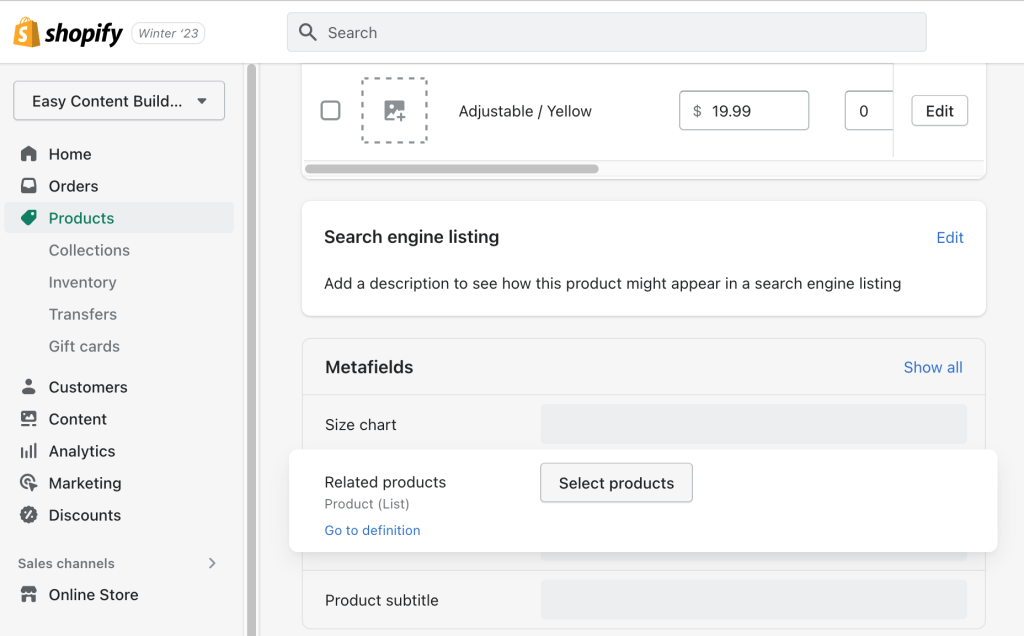
Step 3: Link the product metafields to your template
- From your Shopify admin, click Apps > Easy Content Builder
- Click Manage Templates > find the template of the product you want to edit, then click Customize
- Navigate to the section you want to add the Related Products.
- For example: you add Related Products to the core Product section, simply click Add block > click Featured Products:
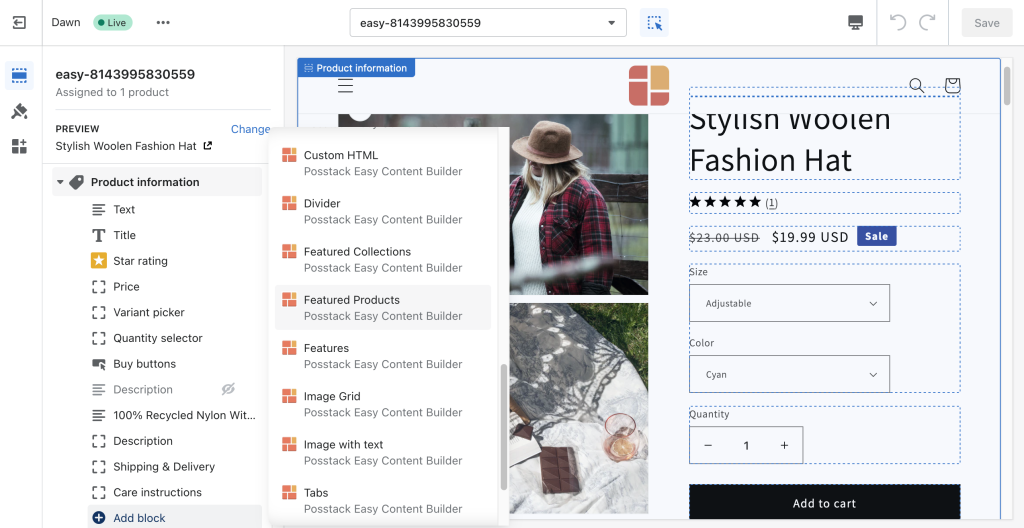
- Open the Featured Products section you’ve just created > click the connect dynamic source icon next to the Select Products field > click Related Products > then click Save to apply the changes to the storefront.
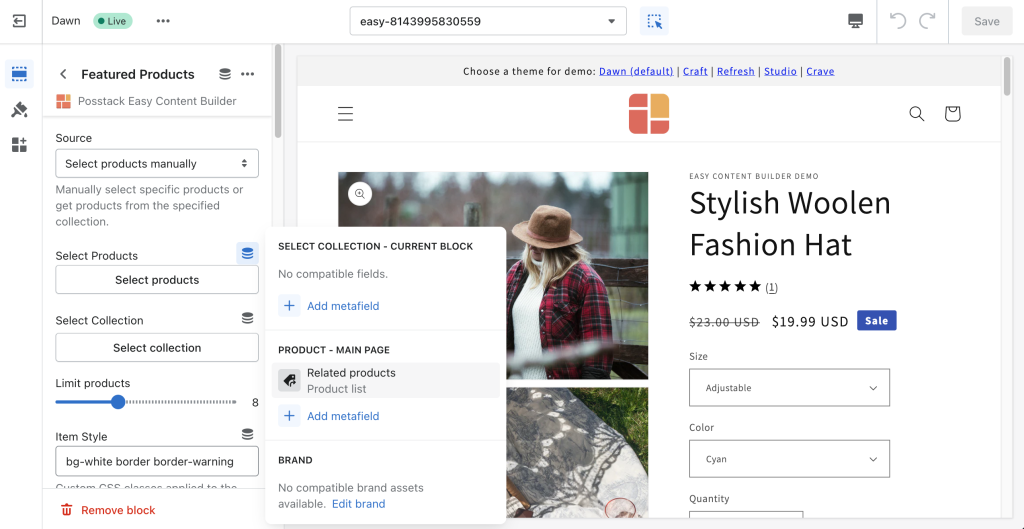
- Once you assign the related products using dynamic sources, you can edit and change the products your way through the Theme Editor.
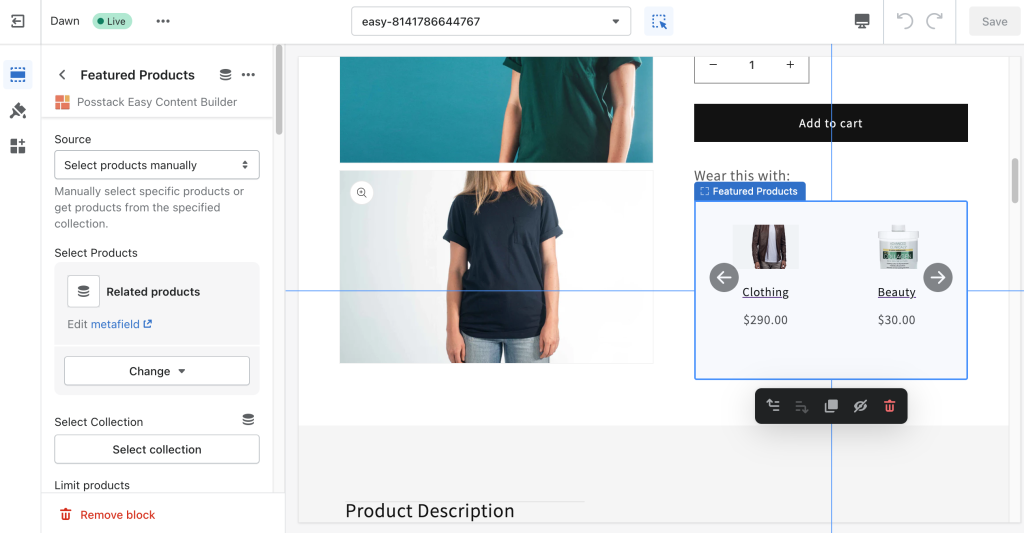
- For example: you add Related Products to the core Product section, simply click Add block > click Featured Products:
Display a custom Product description
You can choose to display or conceal the product description in a product carousel using the Featured Products section. If you want to use a distinct product description instead of the default product description snippet on the product page, follow these guidelines:
Step 1: Create a new metafield definition for the custom product description
- From your Shopify admin, click Settings > Custom Data
- Click Products > click Add definition
- In the Product Metafield definition form, assign a namespace (the group that your metafield will belong to) and a key (the specific metafield name) as follows:
- Name: Short description
- Namespace and key: custom.short_description
- Description: (optional)
- Select type > Product, and make sure you enable Multi-line text.
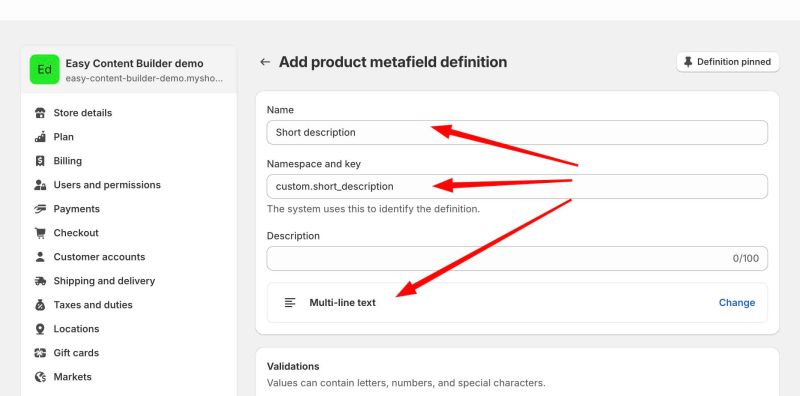
Step 2: Add value to the metafield
- From your Shopify admin > click Products > click the Product you want to add custom short description.
- Scroll down to the Metafields section > click the Short description field to enter the short description you want to display in the Featured Products/Collections carousel.
Step 3: Enable the "Show Description" setting
- From your Shopify admin, click Apps > Easy Content Builder
- Click Manage Templates > find the template you want to edit, then click Customize.
- From the Theme Editor, open the Featured Products/Collections section you wish to edit.
- Enable the Show Description setting.
The Featured Products/Collections carousel will automatically show the short description for any product with a Short Description metafield with a value. Otherwise, it will show the default product description.
Create and display a Product attribute using metafield
If you run a bookstore, you might need to add new product attributes (such as ISBN, author, publisher, publication date) beyond the standard product attributes such as title, price, and description.
Below is an example of how to add an ISBN (International Standard Book Number) on your product pages using metafield.
Step 1: Create a metafield definition for the Related Products
- From your Shopify admin, click Settings > Custom Data
- Click Products > click Add definition
- In the Product Metafield definition form, assign a namespace (the group that your metafield will belong to) and a key (the specific metafield name) as follows:
- Name: ISBN
- Namespace and key: custom.isbn
- Description: (optional)
- Select type > Integer, make sure you enable One value.
Step 2: Add value to the ISBN metafield
- From your Shopify admin > click Products > click the Product you want to add ISBN.
- Scroll down to the Metafield section > click ISBN field to enter the ISBN number:
Step 3: Link the ISBN metafields to your template
- From your Shopify admin, click Apps > Easy Content Builder
- Click Manage Templates > find the template of the product you want to edit, then click Customize
- Navigate to the section you want to add the ISBN number. For demo purpose, you add ISBN to the core Product section, simply click Add block > click Section Title:
- Open the Section Title block you’ve just created > click the connect dynamic source icon next to the Description field > click ISBN. You leave other settings of the Section Title, such as Title, Tagline blank and update Margin/Padding as you wish. Then click Save to apply the changes to the storefront.
Add other content blocks
You can add many content blocks to a section you've created. These content blocks will be displayed in different positions within the section, depending on the Desktop/Mobile Layouts you configure.

